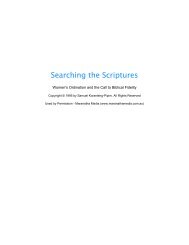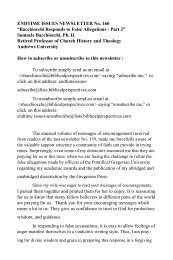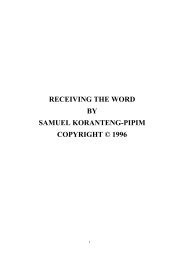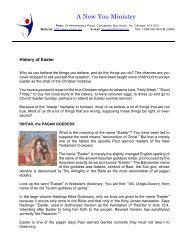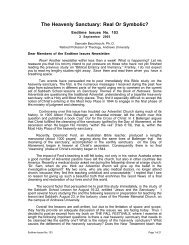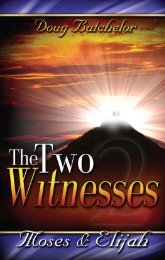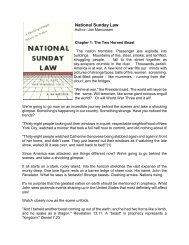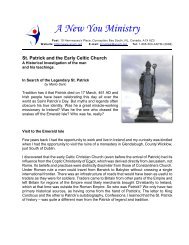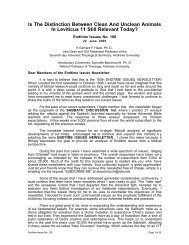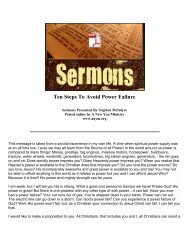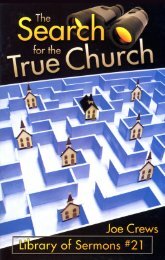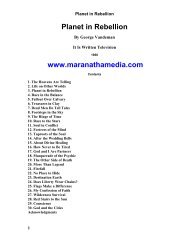Bible Readings for the Home Circleâ1914 - A New You Ministry
Bible Readings for the Home Circleâ1914 - A New You Ministry
Bible Readings for the Home Circleâ1914 - A New You Ministry
Create successful ePaper yourself
Turn your PDF publications into a flip-book with our unique Google optimized e-Paper software.
BIBLE READINGS<br />
THE MORAL AND CEREMONIAL LAWS<br />
{393<br />
393}<br />
1. WHAT title of distinction is given <strong>the</strong> law of God<br />
“If ye fulfil <strong>the</strong> royal law according to <strong>the</strong> scripture, Thou shalt love<br />
thy neighbor as thyself, ye do well: but if ye have respect of persons, ye<br />
commit sin, and are convinced of <strong>the</strong> law as transgressors.” James 2:8, 9.<br />
2. By what law is <strong>the</strong> knowledge of sin<br />
“I had not known sin, but by <strong>the</strong> law: <strong>for</strong> I had not known lust, except<br />
<strong>the</strong> law had said, Thou shalt not covet.” Rom. 7:7.<br />
NOTE.— The law which says, “Thou shalt not covet,” is <strong>the</strong> ten commandments.<br />
3. By what are all men to be finally judged<br />
“Let us hear <strong>the</strong> conclusion of <strong>the</strong> whole matter: Fear God, and keep<br />
His commandments: <strong>for</strong> this is <strong>the</strong> whole duty of man. For God shall bring<br />
every work into judgment, with every secret thing, whe<strong>the</strong>r it be good, or<br />
whe<strong>the</strong>r it be evil.” Eccl. 12:13, 14. “So speak ye, and so do, as <strong>the</strong>y that<br />
shall be judged by <strong>the</strong> law of liberty.” James 2:12.<br />
NOTE.— The law which is here called “<strong>the</strong> law of liberty,” is <strong>the</strong> law<br />
which says, “Do not commit adultery” and “Do not kill,” <strong>for</strong> <strong>the</strong>se<br />
commandments had just been quoted in <strong>the</strong> verse immediately preceding.<br />
In verse 8, this same law is styled “<strong>the</strong> royal law;” that is, <strong>the</strong><br />
kingly law. This is <strong>the</strong> law by which men are to be judged.<br />
4. What system was established on account of man’s transgression<br />
of <strong>the</strong> law of God<br />
The sacrificial system, with its rites and ceremonies pointing to Christ.<br />
{ 394}<br />
5. Why did <strong>the</strong> patriarch Job offer burnt offerings<br />
“And his sons went and feasted in <strong>the</strong>ir houses, every one his day; and<br />
sent and called <strong>for</strong> <strong>the</strong>ir three sisters to eat and to drink with, <strong>the</strong>m. And it was<br />
so, when <strong>the</strong> days of <strong>the</strong>ir feasting were gone about, that Job sent and sanctified<br />
<strong>the</strong>m, and rose up early in <strong>the</strong> morning, and offered burnt offerings according<br />
to <strong>the</strong> number of <strong>the</strong>m all: <strong>for</strong> Job said, It may be that my sons have<br />
sinned, and cursed God in <strong>the</strong>ir hearts. Thus did Job continually.” Job 1:4, 5.<br />
6. How early was this sacrificial system known<br />
“By faith Abel offered unto God a more excellent sacrifice than Cain,<br />
by which he obtained witness that he was righteous, God testifying of his<br />
gifts.” Heb. 11:4. See Gen. 4:3–5; 8:20.<br />
7. By whom was <strong>the</strong> ten commandment law proclaimed<br />
“And <strong>the</strong> Lord spake unto you out of <strong>the</strong> midst of <strong>the</strong> fire: ye heard <strong>the</strong><br />
THE MORAL AND CEREMONIAL LAWS<br />
voice of <strong>the</strong> words, but saw no similitude; only ye beard a voice. And He<br />
declared unto you His covenant, which He commanded you to per<strong>for</strong>m,<br />
even ten commandments; and He wrote <strong>the</strong>m upon two tables of stone.”<br />
Deut. 4:12, 13.<br />
8. How was <strong>the</strong> ceremonial law made known to Israel<br />
“And <strong>the</strong> Lord called unto Moses, . . . saying, Speak unto <strong>the</strong> children<br />
of Israel, and say unto <strong>the</strong>m, If any man of you bring an offering,”<br />
etc. Lev. 1:1, 2. “This is <strong>the</strong> law of <strong>the</strong> burnt offering, of <strong>the</strong> meatoffering,<br />
and of <strong>the</strong> sin-offering, and of <strong>the</strong> trespass-offering, and of <strong>the</strong><br />
consecrations, and of <strong>the</strong> sacrifice of <strong>the</strong> peace-offering; which <strong>the</strong> Lord<br />
commanded Moses in mount Sinai, in <strong>the</strong> day that He commanded <strong>the</strong><br />
children of Israel to offer <strong>the</strong>ir ablations unto <strong>the</strong> Lord, in <strong>the</strong> wilderness<br />
of Sinai.” Lev. 7:37, 38.<br />
9. Were <strong>the</strong> ten commandments a distinct and complete law by <strong>the</strong>mselves<br />
“These words <strong>the</strong> Lord spake unto all your assembly in <strong>the</strong> mount out<br />
of <strong>the</strong> midst of <strong>the</strong> fire, of <strong>the</strong> cloud, and of <strong>the</strong> thick darkness, with a<br />
great voice: and He added no more. And He wrote <strong>the</strong>m in two tables of<br />
stone, and delivered <strong>the</strong>m unto me.” Deut. 5:22. “And <strong>the</strong> Lord said unto<br />
Moses, Come up to Me into <strong>the</strong> mount, and be <strong>the</strong>re: and I will give <strong>the</strong>e<br />
tables of stone, and a law, and commandments which I have written.”<br />
Ex. 24:12.<br />
10. Was <strong>the</strong> ceremonial law a complete law in itself<br />
“The law of commandments contained in ordinances.” Eph. 2:15. {395<br />
395}<br />
11. On what did God write <strong>the</strong> ten commandments<br />
“And He declared unto you His covenant, which He commanded you<br />
to per<strong>for</strong>m, even ten commandments; and He wrote <strong>the</strong>m upon two tables<br />
of stone.” Deut. 4:13.<br />
12. In what were <strong>the</strong> laws or commandments respecting sacrifices<br />
and burnt offerings written<br />
“And <strong>the</strong>y removed <strong>the</strong> burnt offerings, that <strong>the</strong>y might give according<br />
to <strong>the</strong> divisions of <strong>the</strong> families of <strong>the</strong> people, to offer unto <strong>the</strong> Lord, as<br />
it is written in <strong>the</strong> book of Moses.” 2 Chron. 35:12.<br />
13. Where were <strong>the</strong> ten commandments placed<br />
“And he took and put <strong>the</strong> testimony into <strong>the</strong> ark, . . . and put <strong>the</strong><br />
mercy-seat above upon <strong>the</strong> ark.” Ex. 40:20.<br />
14. Where did Moses command <strong>the</strong> Levites to put <strong>the</strong> book of <strong>the</strong><br />
law which he had written<br />
“Moses commanded <strong>the</strong> Levites, which bare <strong>the</strong> ark of <strong>the</strong> covenant<br />
of <strong>the</strong> Lord, saying, Take this book of <strong>the</strong> law, and put it in <strong>the</strong> side of <strong>the</strong>




